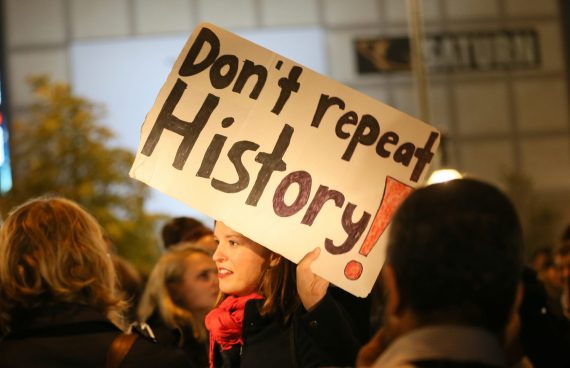German politicians lately announced that they will debate and probably introduce a headscarf ban for girls under the age of 14 in North Rhine Westphalia (NRW). Announced by the NRW Integration Minister, Joachim Stamp, the initiative for such a ban gained both support and objection.
Right populism has increasingly dominated German politics. Since the foundation and particularly since the success of the right-wing Alternative für Deutschland (AfD) in the September 2017 general election, this populist discourse has literally boomed. Although AfD is the youngest political party in Germany, found in 2013, it is arguably one of the most influential actors with its political figures and rhetoric regarding setting the political agenda in the country. So, consequently, we are witnessing how the rest of Germany’s political atmosphere and discourse are shifting to this level and how it is becoming wholly absorbed the right-wing populist rhetoric.
As if it’s not enough that Muslims are criminalized and discriminated in Germany on a daily basis both politically and socially because of their religious identity, the basic human rights of freedom of religion and the right to free practice of religion are literally trampled on within the headscarf debate. The silence while mosques are continuing to be burnt down in Germany, the headscarf ban for Muslim teachers, and the endless debate as to whether Islam belongs to Germany or not are just a couple of events that have been unacceptable so far. With the headscarf ban on pupils however, Germany brings a new of level of hypocrisy, which will inevitably lead to a new level of polarization. Of course, any defender of this ban will try to justify the situation as compatible with the legal order or so-called accepted by society.
One of the defenders of this unconstitutional initiative, Serap Guler (CDU), the undersecretary in the integration ministry of NRW, stated that the headscarf “is what sexualizes the child,” but then added, “when a young woman then says: ‘I want to wear a headscarf,’ that is her right, which we also accept and respect.” Firstly, people may ask, where is the acceptance and respect you seem to offer? Secondly, how many young girls has Mrs. Guler encountered until now who were supposedly forced to wear a headscarf at day-care or elementary school? Thirdly, do the governing people of Germany intend to ban everything they evaluate as wrong or contentious with what is taught to the nation’s children by their own parents? What is the line for that evaluation and estimation? Lastly, what on earth is Germany’s problem with Muslim bodies?
Debates about a headscarf ban, a circumcision ban, a burqa ban and so on… Polemic topics brought to the table from time to time in order to fuel the climate of fear, tension and hate. Pseudo problems that do not exist and evidently solutions that do not help anyone or anything… The fact is, these are all attempts to target Muslim bodies – especially Muslim women bodies – which is an effort of perversion in itself. Politicizing and pointing at other people’s bodies and consequently de-humanizing them is not a rational way of doing politics. On the contrary, it is a sign of the collapse of politics. This type of policy that attempts to discipline and educate Muslim women’s bodies on the one hand and Muslim parenthood on the other reminds us a quote by Foucault’s ‘Discipline and Punish.’ Foucault states that discipline creates individuals as power sees individuals as objects and as instruments. According to Foucault, its purpose is a “permanent economy” for power, which is both modest and suspicious.
Populist politicians in Germany use Muslim bodies as objects and instruments for their political gains. The economy of permanently discrediting Muslims as “problematic” humans who have to be changed in order to be appropriate citizens is being kept alive permanently. Populists also use discriminatory sentiments in grassroots as a capital to strengthen their persistence.
Recommended
Long before these discussions, the debate as to whether Germany lost her title as the advocate for freedom and liberal values had emerged. Although the headscarf and modest clothing are both part of a Muslim woman’s identity and as part of her Islamic personality, the whole discussion has always been kept on a political and symbolic level – not by Muslims but by both politicians and society. Pushing minority practices under bans and restrictions is treacherous for politics. While the history of Germany shows the result of populism, liberal values, which have been lost to the AfD, are being tossed aside in order to gain political support.
Moreover, there are different and much more important problems that Germany needs to be discussing rather than the headscarf ban. To remind the reader, Germany has still not been able to solve the NSU case and the related serial murders against innocent people with the help of state agents, which shows us that German politicians and the public opinion are vesting their energy on a wrong debate. Another serious problem is for instance, the lack of freedom, especially for the Muslim population. Apart from these, Germany has a real social and tangible problem that we also have to point out. According to Saarbrücker Zeitung, 4.9 million people in the country barely have a proper meal every other day. More, figures indicate that 30,000 migrants are currently missing in Germany and that out of these, 9,000 are children. This is nothing but catastrophic.
So why is it that politicians carry a minor issue like the headscarf to the center of politics, but do not solve real and tangible social problems? Center parties such as the CDU in Germany have become sympathetic to marginal initiatives. The country currently needs concrete solutions for both anti-Semitist and anti-Muslim sentiments without being selective between different discriminative incidents.
Nevertheless, the headscarf is neither a political symbol nor an accessory. However, this debate is indeed symbolic and target oriented. The main problem is not supposedly the half dozen young girls who wear a headscarf because of very naïve and simple reasons such as pure curiosity etc. The intention here is to normalize and accustom society to similar restrictions and bans. Thus, the next step following this would initially be a headscarf ban for all Muslim women in public. When this becomes the case, there will be no voice of disapproval or even outrage since these pseudo debates suppress people deeply, leading them to internalize discrimination or polarization so that limits against the freedom of others becomes an everyday and ordinary issue.
The nightmare scenario for Germany after the 2017 election was that AfD, with its populist, racist and fascist attitude, could have become a coalition partner in a minority government. It is currently the third biggest political party now. Nonetheless, we are currently witnessing a political leadership in Germany that could potentially replace the AfD in its polarizing politics. This right question has to be asked again: What does Germany stand for? Freedom and liberalism or populism? Is this the Germany, which is being dreamt of and which is being constructed for the future? Are universal values being sacrificed for short-term political scores and gains?
The fact is that Germany has to save herself from being stuck within this populist atmosphere and has to enhance cultural pluralism with all its institutions and instruments. Otherwise, a dangerous social polarization will be inevitable.





